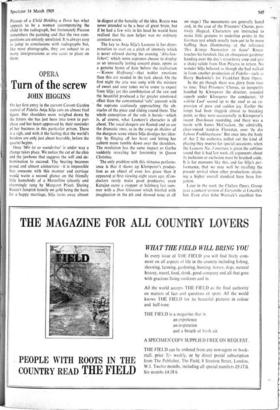Turn of the screw
OPERA JOHN HIGGINS
On her first entry in the current Covent Garden revival of Fidelio Anja Silja cuts an almost frail figure. Her shoulders seem weighed down by the fetters she has just been into town to pur- chase and her heart oppressed by their reminder of her business in this particular prison. There is a sigh, and with it the feeling that the world's burdens are only just about bearable, before the quartet begins.
Once 'Mir ist so wunderbar' is under way a change takes place. We notice the cut of the chin and the jawbone that suggests the will and de- termination to succeed. The bearing becomes proud and almost aristocratic—it is impossible that someone with this manner and carriage would waste a second glance on the friendly little homebody of a Marzelline (cleanly and charmingly sung by Margaret Price). During , Rocco's lumpish homily on gold being the basis for a happy marriage, Silja turns away almost in disgust at the banality of the idea. Rocco was never intended to be a bear of great brain, but if he had a few wits in his head he would have realised that his new helper was no ordinary assistant screw.
The key to Anja Silja's Leonore is her deter- mination to start on a pitch of intensity which is never relaxed during the evening. 'Abscheu- licher!: which some sopranos choose to display as an unusually testing concert piece, opens as a genuine hymn of hate before the realisation —'Komm Hoffnune—that nobler emotions than this are needed in the task ahead. On the first night the aria was sung with the mixture of sweet and sour tones we've come to expect from Silja; yet this combination of the raw and the beautiful produced a far greater emotional effect than the conventional 'safe' account with the soprano cautiously approaching the ob- stacles of the piece and sliding round them. The whole conception of the role is heroic—which is, of course, what Leonore's character is all about. The vocal dangers are flouted and so are the dramatic ones, as in the coup de theatre of the dungeon scene where Silja divulges her iden- tity by flinging off her beret and letting her auburn mane tumble down over the shoulders. The revelation has the same impact as Garbo suddenly revealing her femininity in Queen Christina.
The only problem with this virtuoso perform- ance is that it shows up Klemperer's produc- tion as an object of even less grace than it appeared at first viewing eight years ago. (Con- ductors rarely make good producers; even Karajan came a cropper at Salzburg last sum- mer with a Don Giovanni which bristled with imagination in the pit and showed none at all on stage.) The movements are generally banal and, in the case of the Prisoners' Chorus, posi- tively illogical. Characters are instructed to make little gestures to underline points in the German text which usually turn out to be more baffling than illuminating—at the reference 'Des Konigs Namenfest ist heute' Rocco touches his forelock like an obsequious gardener handing over the day's strawberry crop and gets a shaky salute from Don Pizarro in return. No wonder Silja behaved as though she had walked in from another production of Fidelio—such as Harry Buckwitz's for Frankfurt State Opera.
In the pit though there was glory from time to time. That Prisoners' Chorus, so inexpertly handled by Klemperer the director, sounded superb under Klemperer the conductor; '0 ivelche Lust' soared up to the roof as an ex- pression of pure and sudden joy. Earlier the tempi had been sluggish almost to breaking point, as they were occasionally in Klemperer's recent Dutchman recording, and there was a tussle with James McCracken, the admirabl) clear-voiced stand-in Florestan, over 'In des Lehens Fruhlingstagen.' But once into the body of Act 2 the orchestra pulled out the kind of playing they reserve for special occasions; when the Lenore No. 3 overture is given the sublime sound that it had last week all arguments about its inclusion or exclusion must be brushed aside. It is for moments like this, and for Silja's per- formance, that we may well be recalling the present revival when other productions attain- ing a higher overall standard have been for- gotten.
Later in the week the Chelsea Opera Group gave a concert version of Euryanthe at Lincoln's Inn. Even after John Warrack's excellent bio- graphy, Weber needs all the advocacy he can get operatically—Freischiltz at both Covent Garden and Sadler's Wells was dangerously heavy on the laughs and we are still denied a London production of Oberon.
It would be nice to report that the Chelsea Opera Group, who have put on some stirring performances in the past few years, argued the case convincingly. But, alas, they did not. The completeness-is-all faction took over and there was an uncut Euryanthe in an overheated hall with indifferent acoustics stretching on into the night. The first two acts, played without an in- terval, took close on two hours and three of the four principals—Marie Hayward was the hon- ourable exception—tried to outdo one another in stridency. It was one of those evenings where the intentions were good and the audience rather forgotten.



































 Previous page
Previous page